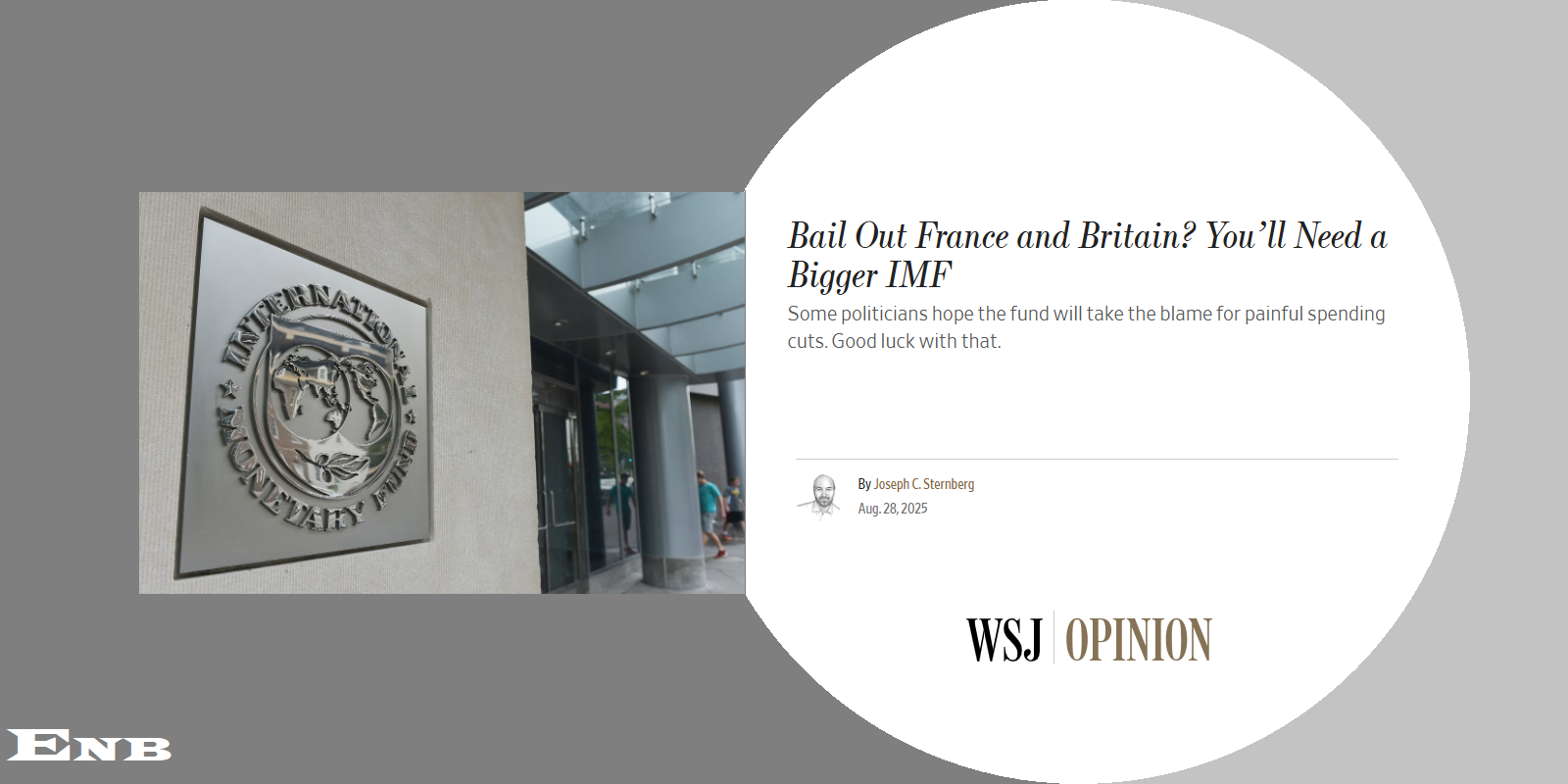The International Monetary Fund headquarters in Washington. Photo: mandel ngan/Agence France-Presse/Getty Images Bad news, Europe: The International Monetary Fund won’t save you.
Bail Out France and Britain? You’ll Need a Bigger IMF
Some politicians hope the fund will take the blame for painful spending cuts. Good luck with that.
By Joseph C. Sternberg WSJ Aug. 28, 2025
Late summer brings a curious trend across the Atlantic—speculation about IMF bailouts for Western European economies. This time it’s the U.K. and France. British economists over the past week have raised the alarm that London could soon face a financial crisis that would require a bailout from abroad. Not to be outdone, French Finance Minister Eric Lombard this week warned that his country also might need to stick out its begging bowl.
This is old ground for Britain. Having embarrassingly required an IMF bailout as recently as 1976, the U.K. suffers mini moral panics periodically when some wonk or another warns that the country is on an unsustainable fiscal or economic path. France is newer to this game but jumping in with reckless abandon. Mr. Lombard is the second official in recent months to raise the prospect of an IMF package for France; Public Finance Minister Amélie de Montchalin floated the idea in June.
It’s hard to believe anyone takes this idea literally, including the people who float it. An immediate difficulty is scale. Britain and France, the world’s sixth- and seventh-largest economies, are too big for the IMF or anyone else to rescue.
The IMF purports to have a total lending capacity of about $1 trillion—more than sufficient to offer modest stabilization for countries such as Sri Lanka or Pakistan. Greece, the largest bailout project to date in Europe, received some €32 billion (about $37 billion at today’s exchange rate) directly from the IMF as part of a series of bigger bailout packages that totaled €326 billion across five years. Compare and contrast with British government debt outstanding of £2.8 trillion ($3.8 trillion) give or take, and French debt of €2.7 trillion ($3.1 trillion).
The bigger challenge to any bailout—but also an important clue to what’s really going on—is that neither Britain nor France has an economic problem for which IMF financial aid would be the solution. If the IMF ever does any good at all, which is debatable, it’s in response to discrete crises such as a banking meltdown or a sudden downgrade in a government’s credit rating. Britain’s 1976 bailout steadied the pound exchange rate while London tried to balance the government budget. The IMF, acting vaguely like a central bank, specializes in smoothing over liquidity panics.
Britain and France aren’t illiquid. They’re insolvent. Their future spending commitments, primarily in the form of expected social-welfare and old-age benefit payouts, far exceed any realistic estimate of the economic growth that will be available to pay those bills. This is unlikely to induce a true default crisis in either country since a market will always exist for their debt. Investors merely will demand an inconveniently high premium to finance these fiscal deficits.
This misfortune already is causing debt-service costs to escalate and is imposing political strains elsewhere in their budgets. Painful belt-tightening eventually will be necessary. Which seems to be the problem the Brits and French are hoping the IMF might fix—by forcing politicians’ hands in Paris and London and thereby taking the blame for the downsides of necessary cuts.
IMF bailout packages notoriously come with painful policy conditions intended to avert the need for future bailouts. These conditions typically require destructive tax increases, broad spending cuts and regulatory reform. In the conference rooms where such deals are negotiated, the idea is to put the public finances on a stable footing through a combination of fiscal restraint and economic growth by forcing politicians to implement reforms they’d otherwise resist.
Credit the crisis Cassandras for wishing with some degree of sincerity for this to be the case. One detects particularly in France an attempt to warn intransigent populist politicians of left and right: Devise substantive fiscal and economic reforms of France’s choosing now, or accept reforms of the IMF’s choosing later. It’s a piquant threat given what happened in Greece a decade ago. In the contest between the populist far-left Syriza party and the international bailouts, the bailouts won.
And yet, out in the wild, the IMF formula too often allows the conventional, nonpopulist political class to do what it would want to do anyway: Increase taxes, reduce spending only where expedient to punish political opponents, and insulate powerful domestic interests from the vicissitudes of economic liberalization. This happens because the IMF lacks any effective mechanism to enforce the better reform elements of its plans but provides a convenient scapegoat for national politicians when the bad policies they do enact inevitably fail to deliver rising prosperity.
So understand that there’s a subtler warning to voters in the latest alarums about impending crises and potential IMF bailouts. Government fiscal sanity and economic growth are in your hands. No one else will do the heavy lifting for you.
Copyright ©2025 Dow Jones & Company, Inc. All Rights Reserved. Appeared in the August 29, 2025, print edition as 'Bail Out France and Britain? You’ll Need a Bigger IMF'.







